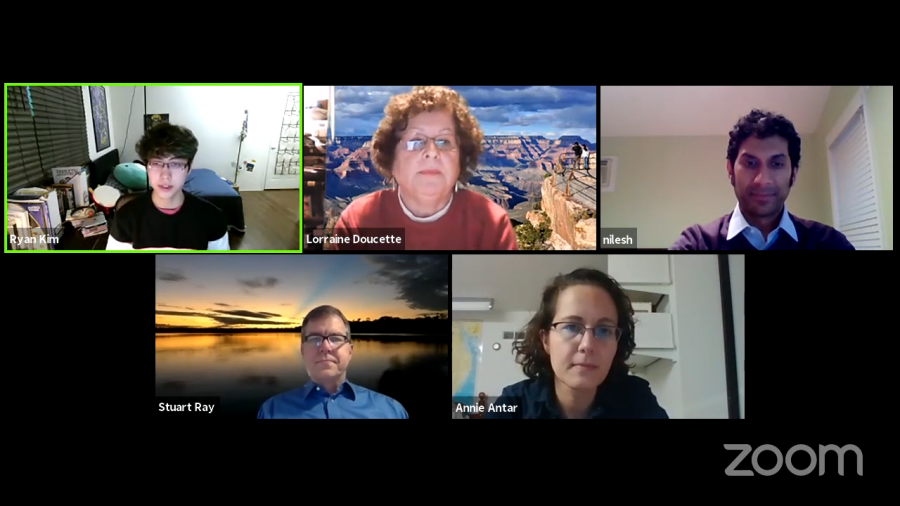SGA hosts COVID-19 panel featuring healthcare professionals
Moderator Ryan Kim (left) reads a question from the audience to Dr. Stuart Ray, professor Lorraine Doucette, Dr. Annie Antar and Dr. Nilesh Kalyanaraman.
April 28, 2020
A panel of four healthcare professionals, including an AACC professor, participated in a live Q&A on the COVID-19 pandemic Sunday hosted by the Student Government Association.
The panelists, including AACC’s professor Lorraine Doucette, chair of medical laboratory sciences, Dr. Nilesh Kalyanaraman of the Anne Arundel County Department of Health, and Johns Hopkins University professors Stuart Ray and Annie Antar, gave viewers of the Zoom forum background on COVID-19, while advising them to follow social distancing guidelines and wash their hands to prevent the spread of the virus.
Moderator Ryan Kim, the SGA’s president-elect and vice president of events and initiatives, read questions from audience members, who asked then over the YouTube chat.
One viewer asked what effect the country’s opening back up would have.
“The hypothetical scenario of everything opening back up is very bad,” Kalyanaraman said. “All the efforts that we’ve been taking over the past six or so weeks at this point—the distancing, the infection control … it slows down the rate of spread.”
“Fighting the curve is a little bit like wearing a parachute on your way down from an airplane,” Ray said. “The question is, ‘When can you take off the parachute?’ Some people are going to want to take that parachute off early. So, I think it’s worth describing what the splat looks like.”
Another viewer asked how age affects a person’s vulnerability to the virus.
Doucette said having multiple pre-existing diseases, which is not uncommon in older people, may make someone more vulnerable.
“If somebody’s into their 60s, their chances of having high blood pressure is much higher than someone in their 20s,” Doucette said. “Or they might have diabetes … which they developed in their 40s. So those two things together, those tend to be high-risk factors for [COVID-19]. … People in their 20s though, could still get the disease.”
Kalyanaraman noted that racial and socio-economic status has led to higher infection and mortality rates for African Americans.
“What we’re seeing here in Anne Arundel [County] is … about twice the number [of African Americans] we would expect, or percentage we would expect … being positive for COVID.”
One viewer with an immunocompromised sister asked what their family should do to protect her from COVID-19.
Kalyanaraman said those who are immunocompromised should follow social distancing guidelines and talk with their doctors about steps they should take.
Before the livestream ended, panelists advised viewers to continue to follow government standards and consider the health of those at risk before breaking social distancing guidelines.
Panelists also advised those with more questions to visit the Center for Disease Control, World Health Organization and Maryland Department of Health sites, and speak with their doctors if they have questions about their own health.
A recording of the stream can be found on AACC’s Youtube channel.












